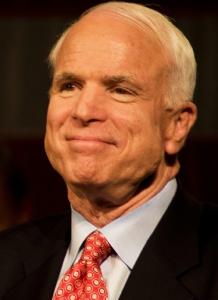
I didn’t always agree with John McCain’s political positions. But, I always saw him as someone who walked the talk, who rose above partisanship, and loved his country more than ideology or political gain. He recognized his fallibility and was willing to admit his personal and political mistakes, recognizing that the moral arc of history in its movement toward justice depends on leaders who aspire toward truth and stature.
Today, we are told that we need to “make America great again,” a campaign slogan with little or no moral or spiritual substance. Indeed, to many observers, the slogan suggests returning to the good old days of white privilege, discrimination against immigrants and persons of color,putting nation first and letting the world be damned, breaking treaties, and focusing on short-term profit over the long-term survival of the planet. Some even go so far, in light of anxieties related to the demographic shifts in the USA, to fear that that slogans really mean hoping to “make America white again,” given the “birther” rhetoric of the current occupant of the White House.
“Greatness” has its own virtue but it usually involves grandeur that provokes envy and awe. In the current political environment, greatness is almost entirely restricted to economic gain, the return to social mores of an earlier era, and the freedom to do whatever I want with my property and firearms, with little regard for any significant ethical or spiritual values or the common good. In fact, among the current leadership, issues such as human rights and planetary well-being are of little or no consequence as our leaders abandon our nation’s moral leadership in global affairs. There is little concern for honesty, civility, equality, or justice. Greatness is determined by winners, and winning seems to be the highest, if not the only, value among our current political leadership.
Two centuries ago, French philosopher Alexis de Tocqueville asserted that “America is great because she is good. If she ceases to be good, she will no longer be great.” These words describe the contrast between McCain and those who lead us today. McCain chose goodness when he could have taken the low road. McCain took unpopular stands when he could have gone along just to get along. He chose decency when he could have taken political advantage, especially in areas of race.
Imperfect, sometimes on the wrong side of political issues, McCain was “good.” No one could doubt his integrity, patriotism, humanity, or love for his nation. He was someone whom we could lift up to our children as a model of courage, endurance, decency, and love of country. He knew that loving our nation meant far more than saluting the flag. It meant our willingness to sacrifice time and talent, and even treasure (a heresy to those who benefited from the recent “tax reform”) for the well-being of our nation. He knew that greatness cannot be achieved without goodness, and so at that 2008 rally and throughout his public career, he ultimately followed the better angels of his nature, rather than promoting the demons of incivility, chaos, and polarization. He embodied stature – largeness of spirit – in a time in which political leaders make a virtue of small ideas and mean spiritedness, extolling fighting fire with fire when forgiveness and reconciliation are virtues of the truly great. Till the very end, McCain’s life reflected the words of Victor Frankl, “Everything can be taken from a man but one thing: the last of the human freedoms—to choose one’s attitude in any given set of circumstances, to choose one’s own way.”
Our nation is great only when it is good, and from John McCain we learned goodness and patriotism that is willing to make sacrifices for the greater good. McCain lived the spirit of John F. Kennedy’s counsel, “Ask not what your country can do for you; ask what you can do for your country.”
To honor the life of John McCain, let us forsake fake greatness and claim the only greatness that matters – moral greatness – reflected in honoring diversity, speaking truth and rejecting falsehood, and placing honor above ideology so that our nation might truly crown its good with brotherhood – and sisterhood – from sea to shining sea.
+++
Bruce Epperly is author of over forty books, including “The Mystic in You: Discovering a God Filled World,” “Becoming Fire: Spiritual Practices for Global Christians,” and “The Gospel of Winnie the Pooh,” and three volumes of an ongoing series of short books on process theology: “Process and Ministry,” “Process Spirituality: Practicing Holy Adventure,” and “Process Theology: Embracing Adventure with God.”












